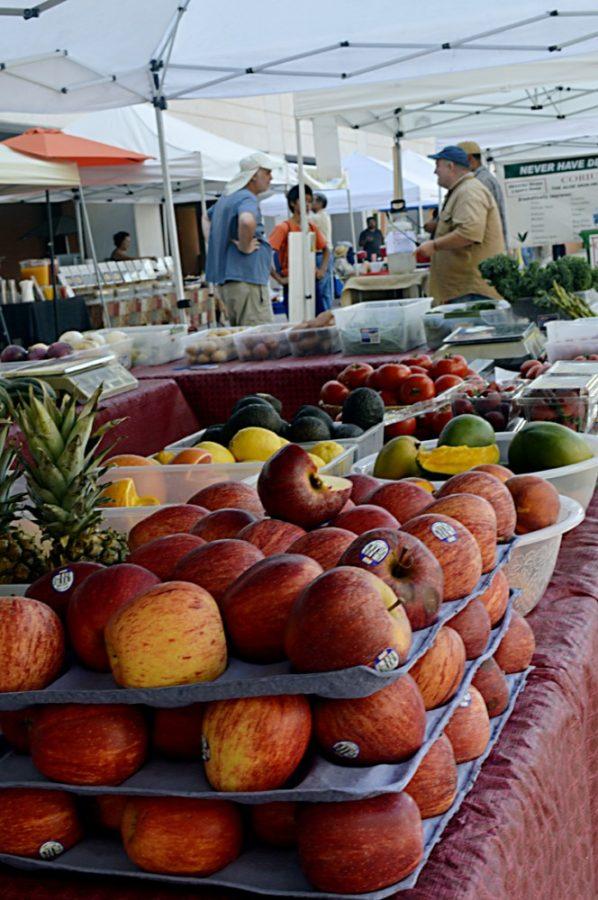From fresh peaches and tomatoes, to soy candles and locally roasted coffee, the Farmer’s Market at the UA is working to promote healthy eating by bringing local businesses to campus.
The market, hosted on the second and fourth Friday of each month, began in May with just six vendors. Since then, it has grown to include a wide variety of local vendors with its last event showcasing 17, according to Dean Ciarniello, retail manager for UA Medical Center Dining Services.
The idea for the market came from UA alumnus and farmer’s market coordinator, Clayton Kammerer, who said the University of Arizona Medical Center seemed like the perfect spot to host the market, as it aligns with what a farmer’s market represents: eating local, fresh, organic and sustainably. The fact that UAMC is associated with the UA also was a plus, as it coincided with the idea of education and promoting the concept of sustainability, he added.
“The whole purpose is education, teaching people that you can get fresh produce, fresh fruits, and get those locally,” Ciarniello said.
As part of its educational mission, the market also offers chef demos for those who do not have time to plan a menu at home.
“We have a nutritional department within our food department, and the nutritional department and the chef get together and put together items from the farmer’s market to showcase it,” Ciarniello said.
One week, the team created a tomato salsa from fresh market tomatoes. Another week, a melon with balsamic vinaigrette, he added.
“You can eat healthy, you don’t have to be a chef,” Ciarniello said. “These are some of the quick things you can do with some of this food that’s here, and that has been received really well.”
Gil Mejias, a vendor from Earth Made, sells a variety of fresh produce, including peaches, strawberries and tomatoes.
His goal for any market he attends, including the UA Farmer’s Market, is to have the freshest and best tasting produce available, he said.
“When you go to the store and you buy something, you’re not going to get anything that tastes that good [as organic produce], you’re just not,” Mejias said, “Because they’re concentrating on shelf life.”
Along with healthier eating, it is also important to purchase locally because it puts money back into the community, he said.
To promote both selling power and buying power for vendors and customers, the market also works on a token program.
Customers who do not have cash can walk up to an information booth located at the market with a credit or debit card, and purchase market tokens in $5 increments, according to Kammerer. These tokens never expire, and are accepted by every vendor.
This system provides more selling power to vendors who cannot take cards, as well as more buying power for customers who don’t carry cash, he said.
“We hope to pull more vendors from the community, to provide more of a diverse items from not only fruits and vegetables but other things,” Ciarniello said. “We have now people that are bringing olive oil, we have people that are bringing locally roasted coffee, so what we hope to happen is for it to just keep growing with variety.”
Just recently, the market has also grown to not only include customers from the College of Medicine and UAMC, but the greater community, Ciarniello added.
“I think it’s really cool,” said Ellie Hutchison, a second year medical student. “I hope this continues … it’s great that not only is it convenient, but you know, it’s good food, good produce.”
According to Kammerer and Ciarniello, the market is scheduled to continue throughout July and August. Plans are also in the works to continue into the academic year.
“That notion of what we put into our bodies really does matter,” Kammerer said. “It’s starting to become more and more important and prevalent everywhere in this country. And being a part of that movement, kind of in the grassroots sector, farmer’s markets, is an awesome way to do it.”
If you go:
Second and Fourth Friday of each month.
10 a.m. to 2 p.m.
July 12, July 26, August 9, August 23









